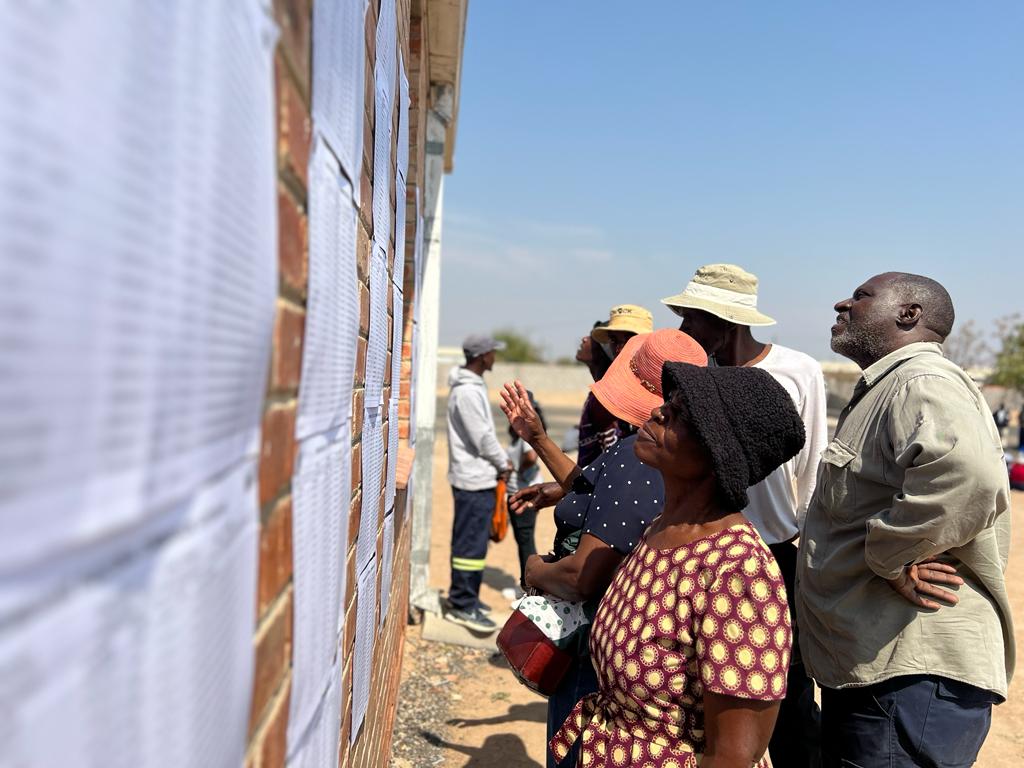NEWS

IN BRIEF
Zimbabwe held a general election on 23 August 2023. Contentious […]
SHARE
Zimbabwe held a general election on 23 August 2023. Contentious elections are not new to Zimbabweans, which in the past have been, and are presently marred by significant irregularities and contestation of election results. However, the events of voting day evidence the resilience and strength of Zimbabweans, who individually had to face and overcome these challenges. What is apparent is the resolve of multitudes who refused to give up and were resolute in defending their right to vote.
Disinformation
Early in the morning, citizens, including those who intended to vote, woke up to streets flooded with yellow fliers. The fliers featured images of Citizen Coalition for Change (CCC) presidential candidate Advocate Nelson Chamisa written in bold, “DO NOT VOTE!!! ELECTION IS RIGGED”.
The fliers were part of a nationwide disinformation campaign promoting voter apathy. However, this was not enough to manipulate voters. Many Zimbabweans reportedly joined polling station queues as early as 5 a.m.
Delayed Commencement of Voting
While monitoring the electoral environment, the Lab noted increasing voter disgruntlement over the late commencement of voting. as the morning progressed. Voting is normally scheduled to begin at 7 a.m., but as the day progressed, more and more people reported delays attributed to a lack of logical government ballot papers at polling stations on social media. For many, voting began at midday.
Some polling stations in Harare and Bulawayo commenced voting at 3 p.m. and others as late as 6 p.m. Undeterred, voters were committed, waiting for the polling stations to open and refusing to leave before casting their ballots. The determination to exercise their democratic right shows their steadfast commitment and integrity of voters.
Frustrations
“We don’t even know what is happening,” said a 36-year-old woman from Cowdray Park in Bulawayo. “No one is communicating with us. We are just standing here, and it’s blazing hot. What makes it worse is that there are older people, and some are hungry. In 2018, we would walk in, vote, and go back home, but now it’s been more than 2 hours of standing here. It is upsetting because we don’t know what is happening. We hoped this year could be better, but it’s not organized. Maybe we will be standing here until midnight. We are hungry, it’s hot, there is no water, we want to ferry water for home use after voting, but we are just standing here. We are not happy,” she added.
These frustrations are the tip of the iceberg of challenges that women, girls, youths, older people, and People with Disabilities (PWD) face due to the Zimbabwe Electoral Commission (ZEC) ‘s delay in opening polling stations.
“I now go and nurse sunburns and blisters due to excessive exposure to the heat and sun waiting for ballots,” tweeted Queen of BaTonga, who has albinism. She was amongst many PWDs who endured the delays to cast her vote.
According to ZEC, the late opening of some polling stations resulted from delayed printing and delivery of ballot papers. Reportedly, ZEC assured SADC observers that all the ballots necessary for the election had been printed days before. The delays led to 77% and 25% of polling stations in Harare and Bulawayo, respectively, failing to open on time (ZIMFACT, 2023).
As a remedy, the government issued an extension to meet the 12-hour time allocation for voting.
Safety and Security Concerns
The extension of voting times to late in the night brought about safety and security risks such as robbery, violence, intimidation, rape, and the lack of transport for voters as they traveled home.
Many voters found that they had to cast their vote far away from their places of residence. The Zimbabwe Electoral Commission redrew electoral boundaries informed by the still contested delimitation report. This redrawing resulted in some voters being redistributed among polling stations. In addition, the exercise created new polling stations, further confusing voters. While voters had been encouraged to check their registration particulars before the election, visiting a ZEC site was not always convenient, and the USSD and website were not always accessible.
For women and girls, voting late compromised responsibilities like childcare, attending to household chores, and ferrying water from boreholes. Despite these challenges and associated risks, they remained committed to exercising their right to vote.
Isolation and Solidarity
WhatsApp played a significant role in connecting and fostering solidarity among Zimbabweans. Many citizens use the platform to discuss political developments, share information, and express their concerns. This sense of community and collaboration demonstrated the resilience of the Zimbabwean voters, who refused to be isolated or silenced. They found unity in supporting one another and standing up for their common goals.
Intimidation
Exit Poll Survey Desks set up illegally within a 300m radius of polling stations by alleged agents of FAZ and ZANUPF engendered fears among voters present and drew criticism from the public and observer missions for intimidation. Voters used mobile phones to expose the agents, posting pictures on social media. The courage to reveal such acts demonstrates public resolve to protect the integrity of the elections.
The resilience displayed by Zimbabwean voters on election day underscores the belief amongst voters that their votes are significant in contributing to change.
—
Bathabile Dlamini is the Media and Communication Officer at Accountability Lab Zimbabwe
